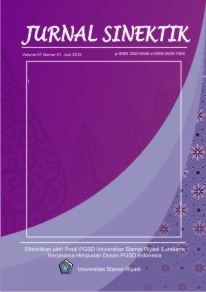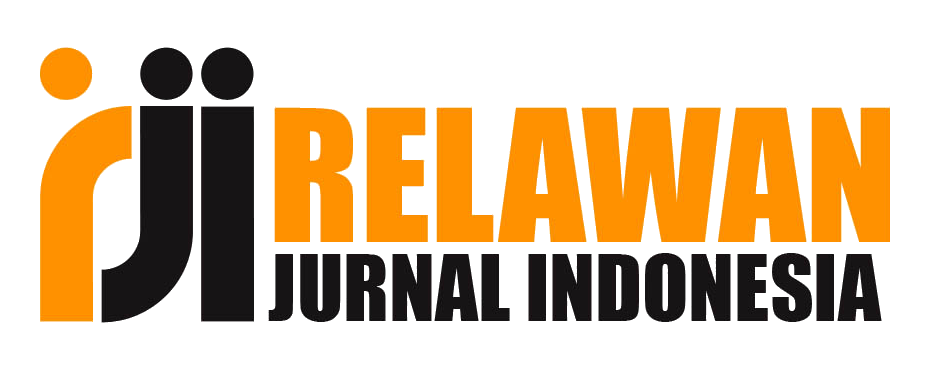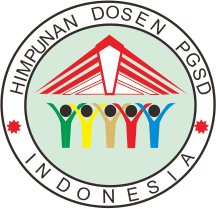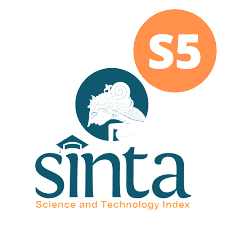Implikasi Implementasi Kurikulum Merdeka di SD Negeri Sidorejo Lor 3 Salatiga
DOI:
https://doi.org/10.33061/js.v7i2.8943Keywords:
implementation, indeindependent curriculumAbstract
This study describes the implementation of the independence curriculum at SD Negeri Sidorejo Lor 3 Salatiga. The purpose of this research is to find out the implementation of the independent curriculum in elementary schools. This type of research is qualitative research. Data was collected by interviewing teachers. The results of this study indicate that the implementation of the independent curriculum pays attention to the philosophy of Ki Hajar Dewantara. The teacher's duty is to guide the growth and development of students in achieving the highest happiness both as individuals and as members of society. Implementation of an independent curriculum makes teachers flexible in developing learning in the classroom. Teachers are no longer burdened with a variety of solid materials and a lot to be completed in a short time. Students become more enthusiastic and enthusiastic in learning activities. The potential possessed by students becomes increasingly visible and developing. The implementation of this independent curriculum is supported by various stakeholders, so that it can run well and smoothly without any obstacles. Guardians of students also support and are actively involved in projects to strengthen the profile of Pancasila students.
References
Angga, Angga, Cucu Suryana, Ima Nurwahidah, Asep Herry Hernawan, and Prihantini Prihantini. 2022. “Komparasi Implementasi Kurikulum 2013 Dan Kurikulum Merdeka Di Sekolah Dasar Kabupaten Garut.†Jurnal Basicedu 6(4):5877–89.
Barlian, Ujang Cepi, and Siti Solekah. 2022. “Implementasi Kurikulum Merdeka Dalam Meningkatkan Mutu Pendidikan.†JOEL: Journal of Educational and Language Research 1(12):2105–18.
Irawati, Deasy. 2022. “Filsafat Pendidikan Ki Hajar Dewantara Sebagai Landasan Pendidikan Vokasi Di Era Kurikulum Merdeka.†JUPE: Jurnal Pendidikan Mandala 7(4).
Isa, Isa, Muhammad Asrori, and Rini Muharini. 2022. “Peran Kepala Sekolah Dalam Implementasi Kurikulum Merdeka Di Sekolah Dasar.†Jurnal Basicedu 6(6):9947–57.
Istiq’faroh, Nurul. 2020. “Relevansi Filosofi Ki Hajar Dewantara Sebagai Dasar Kebijakan Pendidikan Nasional Merdeka Belajar Di Indonesia.†Lintang Songo: Jurnal Pendidikan 3(2):1–10.
Julaeha, Siti. 2019. “Problematika Kurikulum Dan Pembelajaran Pendidikan Karakter.†Jurnal Penelitian Pendidikan Islam 7(2):157.
Jusuf, Heni, and Ahmad Sobari. 2022. “Pembelajaran Paradigma Baru Kurikulum Merdeka Pada Sekolah Dasar: Pembelajaran Paradigma Baru Kurikulum Merdeka Pada Sekolah Dasar.†Jurnal Pengabdian Kepada Masyarakat UBJ 5(2):185–94.
Maladerita, Wiwik, Vini Wella Septiana, Nurhizrah Gistituati, and Alwen Bentri. 2021. “EDUKATIF: JURNAL ILMU PENDIDIKAN.â€
Marlina, Tuti. 2022. “Urgensi Dan Implikasi Pelaksanaan Kurikulum Merdeka Pada Sekolah Dasar/Madrasah Ibtidaiyah.†Pp. 67–72 in Vol. 1.
Nasution, Suri Wahyuni. 2022. “Asesment Kurikulum Merdeka Belajar Di Sekolah Dasar.†Prosiding Pendidikan Dasar 1(1):135–42.
Rahayu, Restu, Rita Rosita, Yayu Sri Rahayuningsih, Asep Herry Hernawan, and Prihantini Prihantini. 2022. “Implementasi Kurikulum Merdeka Belajar Di Sekolah Penggerak.†Jurnal Basicedu 6(4):6313–19.
Sumarsih, Ineu, Teni Marliyani, Yadi Hadiyansah, Asep Herry Hernawan, and Prihantini Prihantini. 2022. “Analisis Implementasi Kurikulum Merdeka Di Sekolah Penggerak Sekolah Dasar.†Jurnal Basicedu 6(5):8248–58.
Wahyuni, Rina, and Teti Berliani. 2019. “Problematika Implementasi Kurikulum 2013 Di Sekolah Dasar.†JMSP (Jurnal Manajemen Dan Supervisi Pendidikan) 3(2):63–68.
Downloads
Published
How to Cite
Issue
Section
License
Copyright (c) 2023 Jurnal Sinektik

This work is licensed under a Creative Commons Attribution-NonCommercial 4.0 International License.
Authors who publish this journal agree to the following terms:
- Authors retain copyright and grant the journal right of first publication with the work simultaneously licensed under a Creative Commons Attribution License that allows others to share the work with an acknowledgement of the work's authorship and initial publication in this journal.
- Authors can separately make additional contractual arrangements for non-exclusive distribution published by the journal (e.g., publish it in a book), with an acknowledgement of its initial publication in this journal.
- Authors are allowed and encouraged to send their work via online (e.g., in the institutional repositories or their website) after published by the journal.














